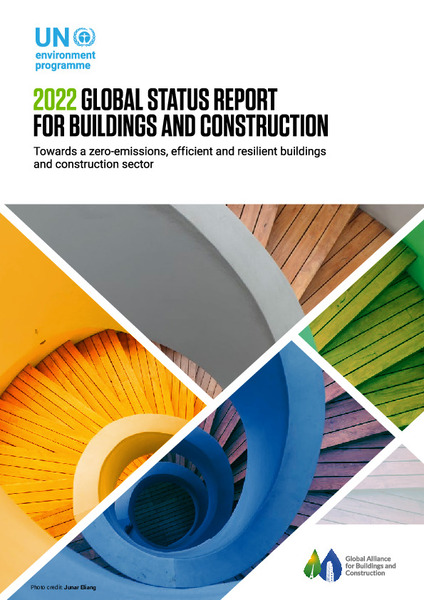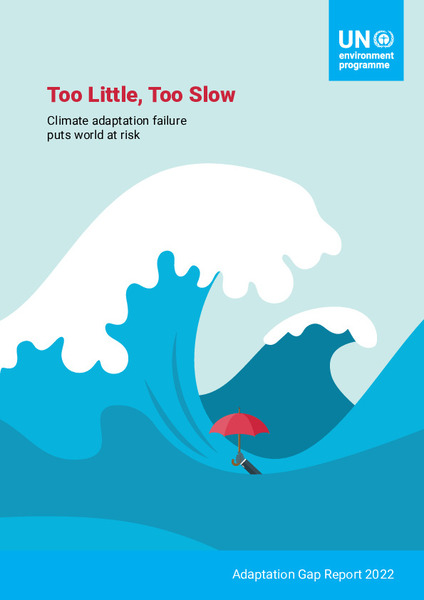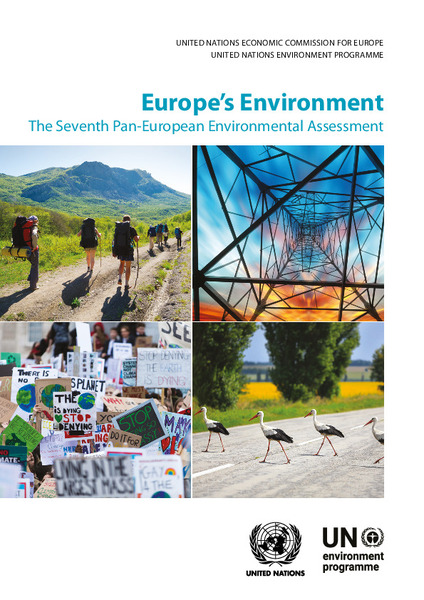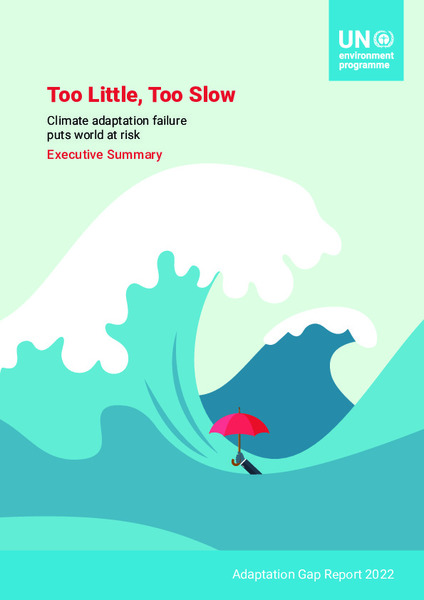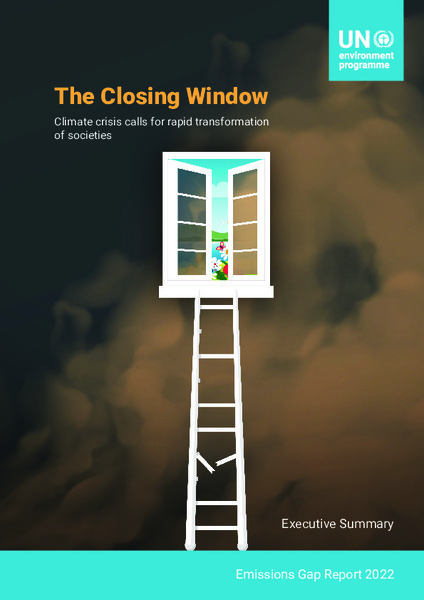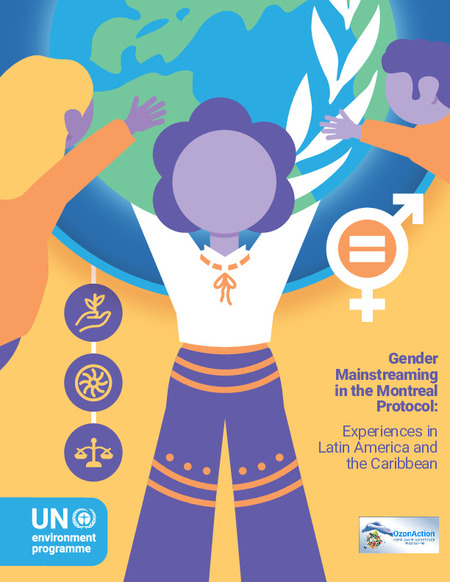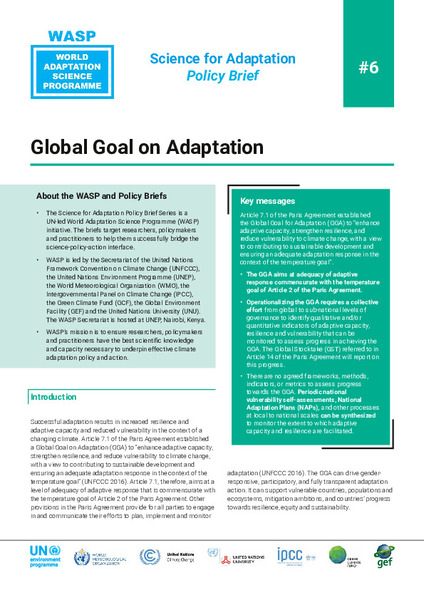Browsing UNEP Publications Pre-2023 by Topic "Climate Action"
Now showing items 1-20 of 33
-
2022 Global Status Report for Buildings and Construction: Towards a Zero‑emission, Efficient and Resilient Buildings and Construction Sector
(2022-11)Decarbonizing the buildings sector by 2050 is critical to delivering these emission cuts – and to addressing the wider triple planetary crisis of climate change, nature and biodiversity loss, and pollution and waste. ... -
The Adaptation Gap Report 2018 - Executive Summary
(2018)The Adaptation Gap Reports focus on providing policy-relevant information to support such efforts. The focus of the 2018 report is dual: The first part examines the gaps that exist in a number of areas that are central to ... -
Adaptation Gap Report 2021: The Gathering Storm - Adapting to Climate Change in a Post-pandemic World
(2021-11)This year’s AGR updates and expands the analysis begun in the 2020 edition of the report by providing information of direct relevance to the UNFCCC Global Stocktake: ▶ Consolidated criteria for assessment of adaptation ... -
Adaptation Gap Report 2022: Too Little, Too Slow - Climate Adaptation Failure Puts World at Risk
(2022-11)Climate change is landing blow after blow upon humanity, The international community must urgently reduce greenhouse gas emissions through a transformation of energy, industry, transport, food systems, financial systems ... -
Building the Climate Change Regime: Survey and Analysis of Approaches - Working Paper
(2011)The purpose of this paper is to help climate change negotiators, other government officials, international institutions, and civil society experts as they jointly work to build the post-2012 international climate regime. ... -
Carbon Pools and Multiple Benefits of Mangroves in Central Africa: Assessment for REDD+
(2014)This report presents the results of a study carried out to assess the carbon pools, ecosystem services and multiple benefits of the mangroves in the Central African countries of Cameroon, Gabon, Republic of Congo (RoC) and ... -
Chapter 2. Framing the Adaptation Gap Report - Adaptation Gap Report 2020
This chapter highlights some of the basic elements of the longer-term approach in terms of assessing adaptation in the context of climate risks. First, climate risks are discussed in the context of the interlinkages between ... -
Chapter 5. Global progress on adaptation implementation - Adaptation Gap Report 2021: The Gathering Storm - Adapting to Climate Change in a Post-pandemic World
(2021-11)The objective of this chapter is to provide a global assessment of the implementation of adaptation, with a particular focus on developing countries. It provides essential information that would not be apparent from solely ... -
Chapter 6. Emerging consequences of COVID-19 on adaptation planning and finance - Adaptation Gap Report 2021: The Gathering Storm - Adapting to Climate Change in a Post-pandemic World
(2021-11)This chapter aims to synthesize the literature that describes how COVID-19 has impacted country-level “adaptive capacity” (see the glossary for a definition and discussion below) and identifies emerging opportunities for ... -
Chapter 7. Outlook on global progress - Adaptation Gap Report 2021: The Gathering Storm - Adapting to Climate Change in a Post-pandemic World
(2021-11)This chapter synthesizes findings from chapters 3 to 6 of this report, with the aim of providing an overview of the status of global progress on adaptation (section 7.1). It also offers an outlook for future developments ... -
Early Warning Systems: A State of the Art Analysis and Future Directions
(2012)At a time of global changes, the world is striving to face and adapt to inevitable, possibly profound, alteration. Widening of droughts in southern Europe and sub-Saharan Africa, an increasing number of disasters, severe ... -
Emissions Gap Report 2019
This tenth edition of the United Nations Environment Programme (UNEP) Emissions Gap Report provides the latest assessment of scientific studies on current and estimated future greenhouse gas (GHG) emissions and compares ... -
Emissions Gap Report 2020
(2020-11)As in previous years, this report assesses the gap between estimated future global greenhouse gas (GHG) emissions if countries implement their climate mitigation pledges and the global emission levels from least-cost ... -
Europe’s Environment: The Seventh Pan-European Environmental Assessment
(2022-10)The seventh pan-European environmental assessment gives an insight into the progress achieved in environmental protection, a cornerstone of life and human health, but also highlights the numerous challenges that need to ... -
Executive Summary — Adaptation Gap Report 2022: Too Little, Too Slow – Climate adaptation failure puts world at risk
(2022-11)The report finds that global efforts in adaptation planning, financing and implementation are increasing incrementally. However, they are not keeping pace with increasing climate risks. Yes, over 80 per cent of countries ... -
Executive Summary — Emissions Gap Report 2022: The Closing Window — Climate Crisis Calls for Rapid Transformation of Societies
(2022-10)This thirteenth edition of the Emissions Gap Report is testimony to inadequate action on the global climate crisis, and is a call for the rapid transformation of societies. Since the twenty-sixth United Nations Climate ... -
Gender Mainstreaming in the Montreal Protocol: Experiences in Latin America and the Caribbean
(2022-11)Taking into account that women and girls constitute half of the world’s population and, therefore, represent half of the potential and innovation necessary to face the “triple planetary crisis” — climate change, nature and ... -
Global Environment Monitoring System: The Potential Socio-Economic Effects of Climate Change in South-East Asia
(1992)This report describes the results of a project funded by the United Nations Environment Programme (UNEP) over 1 988-1 991. -
Global Environment Outlook: For Life on Earth
This volume-GE0-1- is the first product of the GEO Project. It provides a snapshot of a process in the making and aims to move the process along by documenting its progress. The principal focus of GE0-1 is a review of ... -
Global Goal on Adaptation - Science for Adaptation Policy Brief #6
(United Nations Environment Programme, 2022-11)Successful adaptation results in increased resilience and adaptive capacity and reduced vulnerability in the context of a changing climate. Article 7.1 of the Paris Agreement established a Global Goal on Adaptation (GGA) ...


